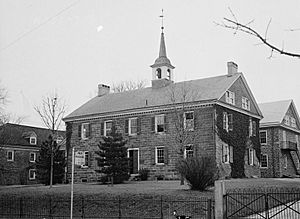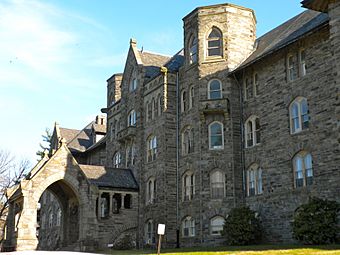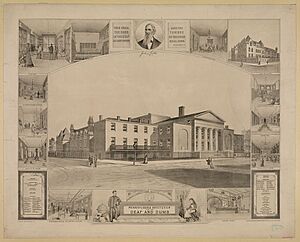Pennsylvania School for the Deaf facts for kids

The Pennsylvania School for the Deaf is a special school that helps children who are deaf learn and grow. It is one of the oldest schools of its kind in the United States. A kind man named David G. Seixas (1788–1864) started it in 1819. He was a crockery maker in Philadelphia who cared about deaf children he saw on the city's streets.
The school's current building is listed as a historic place by the National Register of Historic Places. Two of its former campuses are also recognized as important historic sites. This school is one of four special schools in Pennsylvania. The others are the Western Pennsylvania School for Blind Children, the Overbrook School for the Blind, and the Western Pennsylvania School for the Deaf.
Contents
History of the School
Quick facts for kids |
|
|
Pennsylvania Institution for the Deaf and Dumb
|
|

The old campus
|
|
| Location | 7500 Germantown Ave., Philadelphia, Pennsylvania |
|---|---|
| Built | 1890 |
| Architect | Wilson Brothers & Company Cope & Stewardson |
| Architectural style | Late Victorian |
| NRHP reference No. | 85000999 |
| Added to NRHP | May 9, 1985 |
In 1819, David Seixas began inviting deaf young people into his home. He provided them with food, clothing, and lessons. He paid for all of this himself. More children needed help as people learned about Seixas' kind efforts. So, he rented an office at Eleventh and High (now Market) Streets to use as a school.
In 1821, important citizens in Philadelphia decided to help Seixas. They created a charity called the Pennsylvania Institution for the Deaf and Dumb. The state of Pennsylvania officially recognized this organization. It was meant to be "an asylum and school in the city of Philadelphia." Here, children from wealthy families could pay a small fee, and poor children could attend for free. The state also gave the school money. Bishop William White, an Episcopal leader, was the school's president until he passed away in 1836.
Growing and Moving to New Buildings
The number of deaf children needing special education grew a lot. Soon, a much larger school was needed. This new building was a grand Greek Revival style structure. It still stands today at the corner of Broad and Pine Streets. It was finished in 1826 and later had two additions.
This building is a great example of work by two important architects. They were John Haviland and Frank Furness. In 1892–1893, the Pennsylvania School moved to a large campus in Philadelphia's Mount Airy neighborhood. The Broad and Pine building was then bought by the Pennsylvania Museum & School of Industrial Art. This school later became the University of the Arts. The building is now called Dorrance Hamilton Hall. It is the oldest building still standing on Broad Street.
The School Today
Since 1984, the Pennsylvania School for the Deaf has been in the Germantown area of Philadelphia. It uses several buildings from the Old Germantown Academy site. The school serves students from ages 3 to 18. This includes preschool through high school classes.
The Pennsylvania School for the Deaf is one of four private schools in the state. The Commonwealth of Pennsylvania pays for most of its running costs. This means eligible young people can attend without paying tuition. The school also relies on donations from people who want to help. A special center for deaf and hard-of-hearing adults is also on the campus. It is called the Center for Community and Professional Services.
Historic Recognition of Campuses
The former campus at 7500 Germantown Avenue was added to the National Register of Historic Places (NRHP) on May 9, 1985. It was listed under the name Pennsylvania Institution for the Deaf and Dumb. The 1826 building on Broad Street is also a historic part of the Broad Street Historic District. This district was added to the NRHP in 1984. The school's current buildings are part of the Old Germantown Academy. This site was added to the NRHP in 1972.
Notable Students
Artists Albert Newsam and John Carlin both attended the school. They started their studies there in 1820.
See also
- Emma Garrett
 | Dorothy Vaughan |
 | Charles Henry Turner |
 | Hildrus Poindexter |
 | Henry Cecil McBay |





